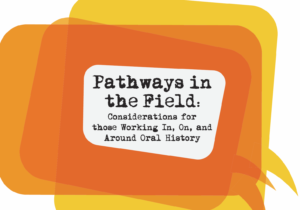 This year’s annual meeting of the Oral History Association (OHA) was hosted in Salt Lake City, Utah, where we caught just a glimpse of the region’s famed winter season, but were kept warm by invigorating discussion of oral history best practices and challenges.
This year’s annual meeting of the Oral History Association (OHA) was hosted in Salt Lake City, Utah, where we caught just a glimpse of the region’s famed winter season, but were kept warm by invigorating discussion of oral history best practices and challenges.
At the OHA conference I was especially impressed by the number of panels on doing oral history with indigenous people. In the roundtable session “Native American Stories of Peoplehood,” panelists grappled with how they incorporated oral tradition from their indigenous communities into oral history. It left me with a good reminder: narrators’ histories do not necessarily begin at birth, and their ancestors may play a large role in how they frame their own lives. One audience question from this session also asked when and how to include proprietary information about tribes in oral histories (i.e.: sacred stories, songs, ceremonies). One panelist remarked that this complicated area is something to review with both narrators and tribal elders. And yet, even when not interviewing in indigenous communities, it is important to discuss parameters for interviews long before pressing record!

Another highlight was the keynote speaker Isabel Wilkerson. The session was standing room only as Wilkerson spoke about her 2010 book, The Warmth of Other Suns: The Epic Story of America’s Great Migration. Wilkerson walked the audience through her process of finding and interviewing individuals whose life experiences humanized the stories of the twentieth-century Great Migration of African Americans from the South to the North, Midwest, and West. I groaned in sympathy as she recalled difficulties in finding narrators. But most importantly, I was drawn to Wilkerson’s understanding that oral histories are precious and time-sensitive products that often need to be prioritized over extensive archival research. I, too, have lost narrators before being able to interview them, and I have often wondered what stories they could have told to change the historical record as we know it. In short, Wilkerson validated the work of oral history, and reminded us that the most important work oral historians do is to help others tell their stories, especially when they change how we view the past.
After attending sessions on making oral history a sustainable career, I walked away from this year’s meeting with an even greater sense of the importance of building a community of oral historians beyond the academy and formalized training programs. Often it is the practitioners on the ground who best connect to under acknowledged individuals with important stories to share. So, as an interviewer with a seat of privilege, my questions to other practitioners are: how do we support oral historians working in the field? How do we further democratize oral history? I look forward to continuing these discussions next year in Baltimore!